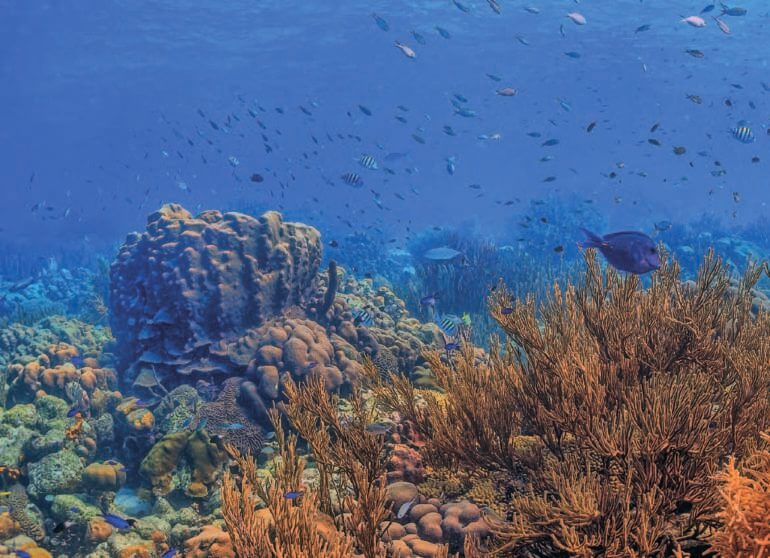Coral reefs, often called the “rainforests of the sea”, are some of the most diverse and valuable ecosystems on Earth. However, they are threatened by various sources, including climate change, and pollution. One less known but significant threat comes from an unexpected source: cosmetics.
Many cosmetic products, including sunscreens, contain chemicals that can harm coral reefs. Oxybenzone and octinoxate, once common ingredients in sunscreens, are particularly damaging. These chemicals can cause coral bleaching, a process where corals expel the algae living in their tissues, causing them to turn completely white. Bleached corals are under more stress and are more likely to die. In 2018, Hawaii became the first state to ban the sale of sunscreens using oxybenzone and octinoxate, citing their potential damage to coral reefs. The policy went into effect in January of this year, and Key West, Aruba, Palau, the U.S. Virgin Islands, and several other tourist destinations have followed suit.
The chemicals can also affect other marine organisms, disrupting ecosystems and food chains. The problem is exacerbated by the sheer volume of these chemicals entering our oceans. Every year, around 14,000 tons of sunscreen are washed off into our oceans. This is particularly problematic in popular tourist destinations with coral reefs, such as Hawaii and the Great Barrier Reef.
However, the impact of cosmetics on coral reefs extends beyond the direct effects of harmful chemicals. Nutrient pollution, which can come from various sources including cosmetics, can make corals more susceptible to disease and other stressors. A study (https://www.nature.com/articles/ncomms11833 ) simulated overfishing and nutrient pollution over three years and found that these stressors increased the cover of turf and macroalgae, destabilized coral microbiomes, elevated pathogen loads, and increased coral disease and mortality. Above-average temperatures exacerbated these effects, further disrupting the microbiomes of unhealthy corals and concentrating 80% of mortality in the warmest seasons.
Another study (https://journals.plos.org/plosone/article?id=10.1371/journal.pone.0138271) highlighted the impact of pollution on coral reefs in the Thousand Islands north of Jakarta, one of the world’s largest megacities. The study found that pollution, including from cosmetics and other personal care products, was the main driver of coral reef degradation in the area.
While addressing complex global phenomena such as climate change presents significant challenges, there are immediate and straightforward measures that can be implemented to aid in coral preservation. One such measure is to ensure the mitigation of coral toxicity by utilizing sunscreens that have been scientifically validated to have minimal detrimental impact on marine coral ecosystems when introduced into the oceanic environment.
In response to this growing concern, a new eco-toxicological test, ReefTox, has been developed. This test is designed to assess the short-term and medium-term impact of cosmetic ingredients
on a population of 50 coral species representative of tropical/ Indo-Pacific bathing areas. The test is based on scientific resources and current recommendations concerning eco-toxicology testing of sunscreen products on corals.
ReefTox is a panel of 32 coral genera with 50 coral species, representing the tropical and Indo-Pacific bathing areas. This selection ensures a broad representation of the coral species found
in these regions, enhancing the test’s relevance and applicability.
The test evaluates a variety of parameters, including physicochemical parameters, concentrations, limpidity, temperature, pH, salinity, redox potential, macro and micronutrients, trace elements
pollutants, visual assessment, photosynthetically activated radiation, health condition, and mortality.
The development of ReefTox comes at a crucial time. The beauty market is growing, with cruelty-free, vegan, and paraben-free claims driving growth. Consumers are increasingly concerned about the environmental impact of their products, and “reef-safe” claims are becoming more critical. However, many beauty brands fail to deliver on these claims, leading to class actions and further endangering coral reefs.
ReefTox, in collaboration with SGS, offers a solution to this problem. Providing a more accurate and comprehensive assessment of the impact of cosmetic ingredients on coral reefs can help
beauty brands ensure their products are genuinely “reef safe.”
This not only benefits the brands by strengthening their claims and avoiding potential legal action but also helps to protect the vital coral reef ecosystems that our planet depends on. While the impact of cosmetics on coral reefs is a significant problem, it is one that we have the power to address. By making informed choices about the products we use and supporting policies that protect our oceans, we can help ensure the survival of these vital ecosystems for future generations.



